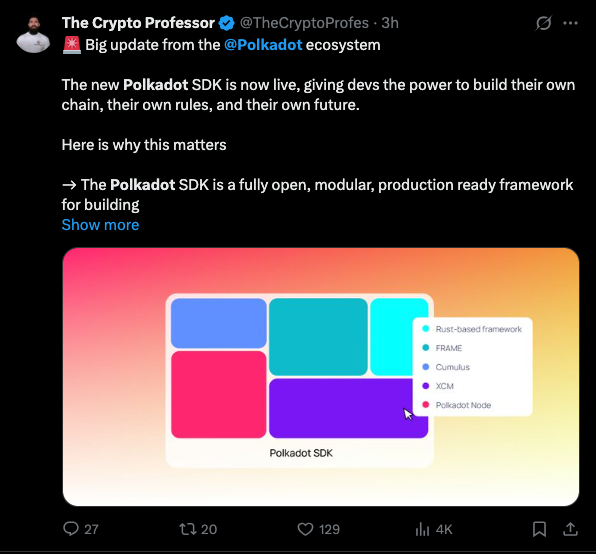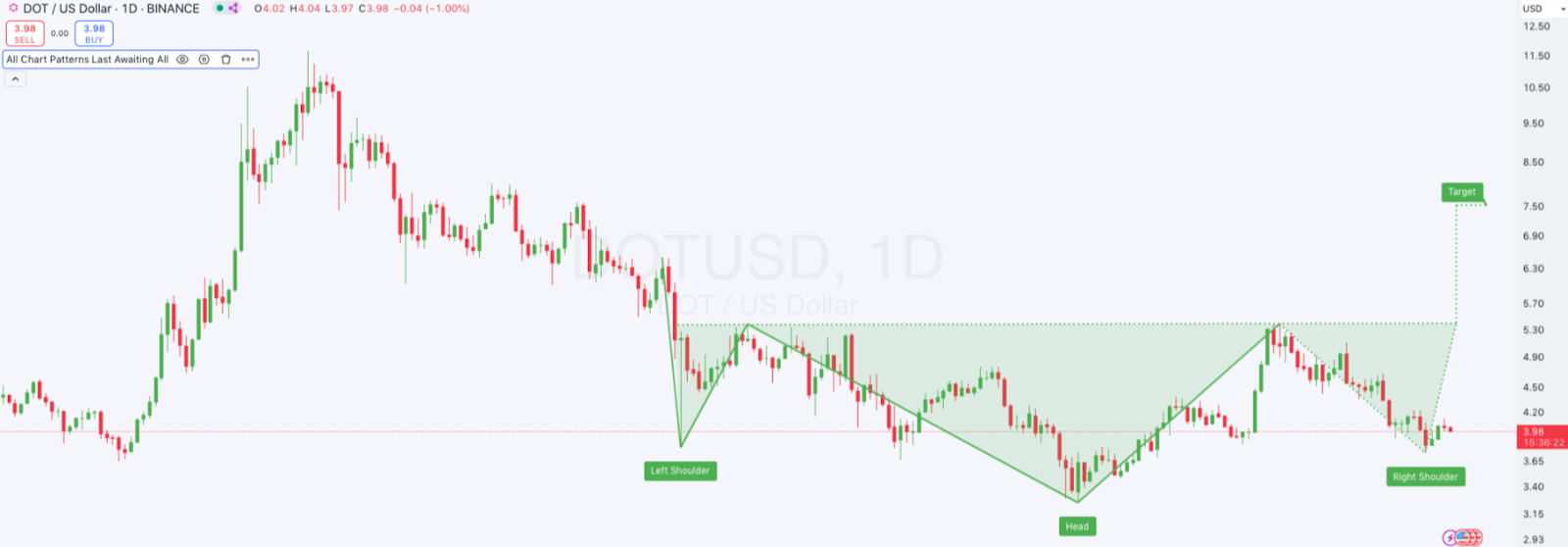- Polkadot Crypto has unveiled its SDK, which offers developers the flexibility to create customizable blockchain solutions.
- Cross-ecosystem compatibility could drive increased adoption and demand for $DOT.
- The SDK’s enterprise readiness may strengthen Polkadot’s ecosystem and price growth.
Polkadot crypto introduced a significant update to its ecosystem that may influence both developers and the rest of the industry.
Developers can now download the new Polkadot SDK and use it to design blockchains, adjust their rules, and create special ecosystems.

Polkadot SDK is a free, flexible framework that enables developers to create blockchain networks. This SDK has better and more advanced features than the earlier Substrate framework, which was founded by the same team as Polkadot and Kusama. It has been created to be the top pick for blockchain development.
With this SDK, developers will be able to customize their blockchain ecosystem to control things such as consensus, governance, token setup, fee structure, and connections to bridges.
In the past, this level of adjustment could not be done within Polkadot’s ecosystem. Currently, developers have an easier time customizing blockchains for their projects using the SDK.
Key Features of the Polkadot Crypto SDK
Polkadot SDK comes with many helpful settings that make it a favorite for blockchain programmers. First, developers can customize their blockchain’s elements, such as consensus, governance, token rules, and fees.
This quality separates Polkadot from other platforms because it helps build individual networks for particular purposes.
Besides being flexible, the SDK allows different ecosystems to work together in Polkadot. Builders are now able to use blockchains apart from Polkadot.
They can now grow their chains so that they interconnect with different ecosystems, helping to reach the goal of blockchain interoperability. It allows more opportunities for teamwork and ideas to be shared all over the blockchain industry.
Big enterprises are already taking advantage of Polkadot’s SDK, which supports KILT, Zeitgeist, Frequency, and Pendulum projects.
This indicates that the SDK can work with large-scale apps and is designed for good scalability, which fits any business.
Its modular architecture is also noteworthy, so that developers can pick out the necessary features for the type of application they want to build.
Rollups, parachains, and appchains make it possible for the SDK to help develop new blockchain networks much faster.
Lastly, the Polkadot SDK has been constructed for the highest level of speed. As it is decentralized and requires less storage, web3 applications scale up and cost much less to manage. Thus, it is very efficient for building functional blockchains that work fast and cost less.
Polkadot Crypto Current Market Outlook
Polkadot crypto was trading at $3.98 as of press time, down 1.04% compared to its previous 24-hour price. In the past few days, Polkadot’s value has remained around $3.90 and $4.10, proving that $3.80 acts as a support level. It seems clear from its price that the token is managing well despite the recent ups and downs in the market.
We notice that the liquidation events for $DOT change a lot when the market is correcting, with an apparent rise in the amount of liquidated positions.
January 6th and May 31st saw a surge in liquidations that happened alongside fluctuations in the price of Bitcoin from $5.00 to $6.00.
This shows that the increased activity in the Polkadot market frequently coincides with times of turbulent prices.
Polkadot’s new SDK could attract more users and interest in the $ DOT token. Even so, the market needs time to analyze the changes and observe how developers and business groups apply the SDK to their work. Increased SDK usage over time could help the $DOT price grow more positively.
Polkadot Crypto Charts Showing a Bullish Outlook
Besides the price movements shown in the charts, a Head and Shoulders formation can be noticed in the third one.
The chart pattern usually points to a switch in current market trends, and suggests that Polkadot is likely to rise soon.
The left shoulder has a downward trend, the head has a top that is higher than the others, and the right shoulder is identical.
Typically, the price target is estimated by measuring the distance from the head to the neckline and then project it upwards from the place where the stock breaks out.
Presently, Polkadot’s price stays near $3.98, which could indicate the formation of the right shoulder.
Once the price goes past the neckline, this trend may point to $4.20 to $4.50, meaning a possible bullish direction in the market.
The burst of activity around a specific price mark could kick off an upward price trend to the new highs.

The introduction of the Polkadot SDK marks a significant improvement for the blockchain industry. It gives developers everything they require to establish personalized, expandable, and compatible blockchain networks.
Since Polkadot keeps updating its tools, such as the SDK, it is likely to contribute significantly to the blockchain industry in the next few months, and the value of $DOT could change.
